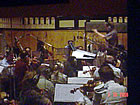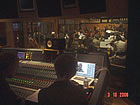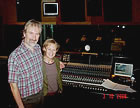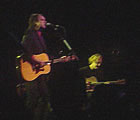Letters from Charlie...
October 5, 2006

London orchestra (about
thirty instruments) putting music sound track on our BBC documentary, Bear
Man of Kamchatka.
Monitor in studio showing
what will be on screen at the time each bar is played.
David and Sue Mitcham. David is composer and conductor....Sue the technical director of studio sessions and musician.
Mark Johns, guitarist.
Guitar is the lead instrument for the music score.
(Click on any Image to see a higher resolution version)
October 5th, 2006
I know it has been a long silence since I last wrote an entry to this web site and my only excuse is that for a very long time I never knew what I would be doing. For the first time in 12 years, I could not raise the funding for carrying on my work in Russia, but I guess it is not surprising that I could not go on for ever doing this. As some of you know, a movie was in the works and I thought that this would cover the $60,000's of expenses that it cost to run a program per year, because my presence there is critical for keeping things going and protecting the area around my cabin from poaching. The movie people kept promising that I would get this money so that I could go, but the date that a cheque would arrive kept being set back and is still being set back, so my life has been in limbo since last March.
I am writing this from Bristol England where I am working on a few last details for the BBC documentary that was made in 2005 about my work there in Kamchatka. It is being co produced by CBC, The Nature of Things in Canada and by Animal Planet in the US. It is airing in England, on BBC 2, The Natural World on November 8th, but dates are not yet set for North American television, but it will be shown sometime in early winter. I am blown away by how wonderfully sensitively Jeff and Sue Turner of Princeton BC have put this film together. The title of it, in England at least, is Bear Man Of Kamchatka. I have never referred to myself as a "Bear Man", and sort of hate it, but that is how it goes in the marketing world.
In September, before coming to England, I have been doing a hazard assessment for the communities of Sunshine Village and Yale, both near Hope BC. This is for the Bear Smart program set up by the government which is trying hard to make communities safe for both bears and people in the province of British Columbia. Working on this is a wonderful opportunity for me to finally understand about the human side of the bear/people equation. I have devoted much of the last 45 years to understanding bears; figuring out what they are capable of with regarding getting along with us. The answer is that they have no problem at all as long as we follow a few simple rules. I found that if we manage food and waist so bear can't get into it and treat the bears with respect , they are wonderfully easy animals to get along with. Teaching respect does not mean being violent with them in any way.
Now I get to see if people are sophisticated enough to drop their fear and do their part.Garbage has to be kept away from bears so they are not drawn into towns and cities where they are not tolerated. People are having to learn about putting their garbage out in the morning, just before collection time. Each fall hundreds of bears are killed in BC when people are careless about this. Even though virtually no one gets hurt by them when they do come into town, there is no tolerance for urban bears.
As posted, I am doing a presentation in Canmore Alberta as soon as I get back to Canada (click here for more info). This will be about my experiences in Kamchatka and what I have learned from bears over the past 45 years.Bye For Now,
Charlie
© Pacific Rim Grizzly Bear Co-Existence Study, 2006


